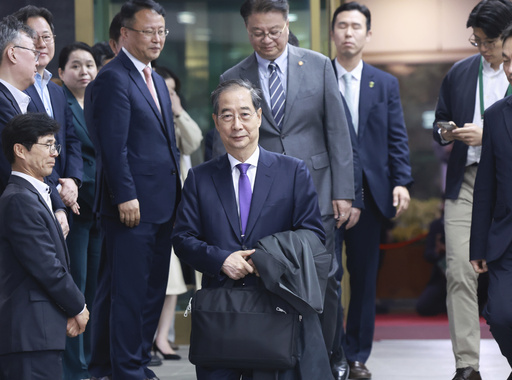SEOUL, South Korea — On Thursday, South Korea’s acting leader, Prime Minister Han Duck-soo, announced his resignation as anticipation builds around his potential candidacy for next month’s presidential election.
Amid the disarray following the ousting of President Yoon Suk Yeol, Han has surfaced as a possible candidate for the conservative People Power Party. Political analysts predict that Han may officially announce his presidential run on Friday.
In his public address, Han stated, “I stand at a crossroads. I can either continue with the significant responsibilities I currently have or lay them down to pursue a greater commitment. I have decided to relinquish my position to address and contribute towards resolving our nation’s pressing crises.”
Han, who was appointed as the country’s Prime Minister by Yoon, is the likely choice to spearhead a unified conservative challenge against the liberal front-runner, Lee Jae-myung, according to political experts.
Who is Han?
At 75, Han is a seasoned bureaucrat, possessing almost four decades of public service experience and a doctoral degree in economics from Harvard. He has occupied several key governmental roles across both conservative and liberal administrations, including trade minister, finance minister, and ambassador to the United States. Han has served as Prime Minister twice, first during President Roh Moo-hyun’s liberal administration from 2007 to 2008, and then during Yoon’s tenure.
Proponents of Han argue that his extensive experience, particularly regarding economic matters, positions him as a suitable leader to handle aggressive tariff policies and other economic issues. However, critics point out his lack of an elected position and express concerns over his age as potential hurdles for his presidential bid.
The main liberal opposition party, the Democratic Party, criticized Han’s decision. Spokesperson Cho Seung-rae commented, “Prime Minister Han Duck-soo, blinded by ambition, is choosing to desert national affairs, only to face the public’s severe rebuke.” South Korean media reported Han would officially end his term at midnight after signing the necessary document.
Following his resignation, Deputy Prime Minister Choi Sang-mok was expected to serve as the acting leader until the presidential election scheduled for June 3. However, Choi resigned on Thursday night after the Democratic Party, holding a parliamentary majority, unexpectedly passed an impeachment motion against him. This leaves Deputy Prime Minister Lee Ju-Ho as the next in line to become acting leader.
Legal hurdles for Lee
Lee Jae-myung, who was nominated by the Democratic Party on Sunday, had been seen as the favorite to succeed. Nonetheless, his campaign faced a setback on Thursday when the Supreme Court ordered a reevaluation of a past judicial decision that had repealed his election law violation conviction.
The outcome of the Seoul High Court’s reassessment ahead of the June 3 election remains uncertain, yet it has provided Han and other conservative opponents with material for political confrontation. Under South Korean legislative provisions, any individual fined over 1 million won ($683) for violations of election law is prohibited from running for public office for five years.
The Democratic Party accused the Supreme Court of attempting to meddle with the election. Han assumed the role of acting leader after the opposition-controlled assembly removed President Yoon on Dec. 14 over an abrupt martial law declaration. However, Han then found himself at odds with Lee’s Democratic Party over his refusal to appoint three new justices to the nine-member Constitutional Court, which was set to decide Yoon’s fate.
In late December, Han faced impeachment by the Democratic Party and smaller opposition factions, charged with hindering the court’s restoration and supporting Yoon’s extreme measures. Yet, the Constitutional Court overturned Han’s impeachment in March, reinstating his position as acting president and likewise dismissed Yoon’s case in early April.
Meanwhile, Yoon faces separate criminal charges related to the martial law decree, with new allegations of power abuse added by prosecutors on Thursday.



